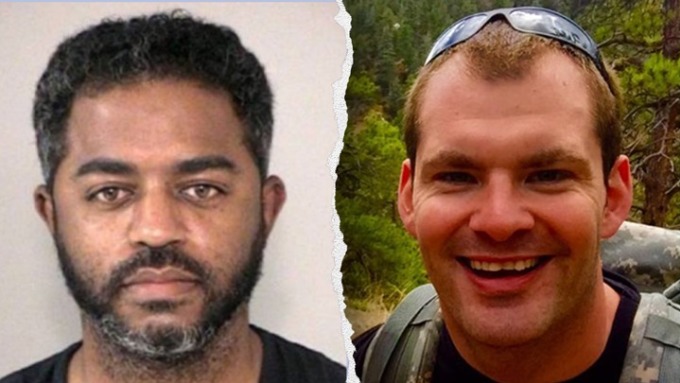
Two recent incidents involving a car attack and an explosion in the U.S. highlight the struggles of military veterans who fought in Afghanistan, shedding light on psychological challenges they face after returning home.
In the early hours of January 1, Shamsud-Din Jabbar drove a vehicle into a crowd celebrating New Year’s in New Orleans, Louisiana, opening fire and killing 14 people while injuring dozens. Hours later, Matthew Livelsberger drove a Tesla Cybertruck packed with fireworks and explosives to the Trump Hotel in Las Vegas, Nevada. After committing suicide with a gun, his vehicle exploded, injuring seven people.
The two incidents, occurring over 1,500 miles apart, share striking similarities. Both Jabbar, 42, and Livelsberger, 37, served in the U.S. Army and were deployed to Afghanistan. Jabbar had been discharged, while Livelsberger was an active-duty Green Beret.
Investigations into the two men reveal a darker side of military service: the risk of veterans engaging in violent acts, potentially due to radicalization or mental health struggles stemming from their combat experiences, particularly in Afghanistan.
Jabbar's Radicalization
Before his attack, Jabbar posted several videos on social media, declaring he had joined the Islamic State (IS) terrorist group the previous summer. Authorities suspect he had been radicalized, though it remains unclear when this process began. Friends and neighbors reported no obvious signs of extremism in his behavior.
Livelsberger's Psychological Struggles
In Livelsberger's case, a note on his phone revealed his intention to "purge his mind of the faces of fallen comrades and free himself from the burden of lives he had taken." The FBI suspects he suffered from post-traumatic stress disorder (PTSD).
PTSD can develop after experiencing or witnessing traumatic events such as combat, natural disasters, or severe accidents. It is characterized by intrusive symptoms like flashbacks, nightmares, and emotional distress tied to the traumatic event. Sufferers may avoid places, situations, or conversations that remind them of their trauma.
The Broader Challenges of Transitioning to Civilian Life
Sam Andrews, a former Army lieutenant colonel and board member at Bravo Zulu House—a transitional facility for veterans with PTSD or addiction—highlighted the difficulties soldiers face when transitioning to civilian life.
"Discharge is one of the biggest challenges veterans encounter," Andrews said. "They lose purpose, meaning, and a sense of belonging."
Adam Ramsey, 35, a former Army soldier who served in Afghanistan and Iraq, acknowledged that some service members avoid seeking mental health support for fear of being assigned fewer responsibilities or losing opportunities.
"I saw this happen to a few people," said Ramsey, who served for a decade and was diagnosed with PTSD. "Fortunately, my superiors supported my treatment."
After leaving the military, Ramsey struggled with anger issues, strained relationships, and unrealistic expectations for his young child. Haunted by memories of combat, including killing a young insurgent in Afghanistan, he felt like "a monster." His wife eventually confronted him, saying, "You're not the man I married."
The Long-Term Impact
Desmond Cook, a former Marine who served in several conflict zones, described a similar post-service identity crisis. After his discharge in 2008, he felt he had no skills outside of "blowing things up and eliminating threats." Struggling with anger and overstimulation, he turned to alcohol and drugs. Cook later sought treatment for PTSD after multiple suicide attempts.
While most veterans reject violence, they acknowledge that repressed anger or unresolved trauma can exacerbate everyday stress. Military experts emphasize that incidents like those involving Jabbar and Livelsberger are exceptions but underscore the widespread pressures faced by veterans.
Statistics and Challenges
According to the U.S. Department of Veterans Affairs, about 7% of veterans suffer from PTSD, a rate three times higher for those with combat experience. The incidents on January 1 also raise questions about the effectiveness of government support for veterans and the ability to detect early warning signs. When veterans become radicalized, their actions can be particularly dangerous.
The National Consortium for the Study of Terrorism and Responses to Terrorism (START) reports that nearly 16% of extremists involved in criminal activity in the U.S. since 1990 have military training. These individuals are more likely to plan high-casualty attacks than those without such experience, according to researcher Michael Jensen.
Military Response
Pentagon Deputy Press Secretary Sabrina Singh announced on January 3 that all medical records of Livelsberger had been handed over to local law enforcement. She urged service members to seek mental health support through military or civilian resources.
"If you need help, feel the need for mental health support, or simply need someone to talk to, please seek appropriate services, both on and off base," Singh said.
(Sources: WSJ, Newsweek)
Hello Shuttle will strive to bring the latest updates. At the end of the day.
Are you looking for reliable airport and cruise port transfer services in Los Angeles?
We offer professional, safe, and punctual transportation from
Los Angeles Airport - LAX
Long Beach Airport - LGB
John Wayne Airport - SNA
San Pedro cruise port
Long Beach cruise port
Disneyland
and other destinations.
Let us make your journey stress-free and comfortable with our dedicated drivers and high-quality vehicles. Book now for the perfect travel experience at www.helloshuttle.com or call 944-800-5678!


